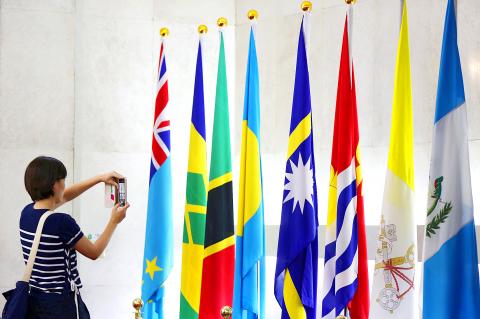The Ministry of Foreign Affairs is to give funding originally intended for the Solomon Islands and Kiribati to Taiwan’s remaining four Pacific allies, a diplomatic source said.
Taiwan cut diplomatic ties with the Solomon Islands and Kiribati on Monday and Friday, respectively, after the two countries switched allegiance to China.
Taiwan now has 15 diplomatic allies.

Photo: EPA-EFE/Ritchie B. Tongo
The source, who asked to remain anonymous, last week said that the ministry had sent its budget proposal for next year to the Legislative Yuan in late August and is awaiting lawmakers’ approval.
Asked about the budget originally earmarked for the two countries, the source said the money is expected to be used to solidify ties with Taiwan’s remaining Pacific allies, but did not disclose the exact amount to be reallocated.
Taiwan still has four Pacific allies: the Marshall Islands, Nauru, Palau and Tuvalu.
Nauru and Tuvalu have just elected new political leaders, while Palau and the Marshall Islands are soon to hold general elections, the source said.
A major shift in power could affect their relationship with Taiwan, the source said, adding that the ministry needs all the resources it has to solidify ties with the four.
Minister of Foreign Affairs Joseph Wu (吳釗燮) on Friday said that ties with the remaining Pacific allies are very close and he sees no reason to worry.
The ministry’s budget proposal for next year stands at NT$28.2 billion (US$910 million), a NT$2.2 billion increase from a year earlier.
The increase is mainly to be used for foreign aid projects in response to Beijing’s campaign to lure Taiwan’s diplomatic allies, the ministry said.
The budget is to be used to provide assistance to diplomatic allies through bilateral cooperation projects that boost construction of infrastructure, and education and training programs, it said.
Taiwan has lost seven diplomatic allies to China since President Tsai Ing-wen (蔡英文) assumed office in May 2016.
Beijing has taken a hardline stance on cross-strait relations since Tsai refused to accept the so-called “1992 consensus.”
The “1992 consensus,” a term former Mainland Affairs Council chairman Su Chi (蘇起) in 2006 admitted making up in 2000, refers to a tacit understanding between the Chinese Nationalist Party (KMT) and the Chinese government that both sides of the Strait acknowledge there is “one China,” with each side having its own interpretation of what “China” means.
However, Beijing has never publicly recognized the second part of the consensus.

The Chinese military has built landing bridge ships designed to expand its amphibious options for a potential assault on Taiwan, but their combat effectiveness is limited due to their high vulnerability, a defense expert said in an analysis published on Monday. Shen Ming-shih (沈明室), a research fellow at the Institute for National Defense and Security Research, said that the deployment of such vessels as part of the Chinese People’s Liberation Army (PLA) Navy’s East Sea Fleet signals a strong focus on Taiwan. However, the ships are highly vulnerable to precision strikes, which means they could be destroyed before they achieve their intended

The Taiwan Experience Education Program (TEEP) has funded short-term internships in Taiwan for more than 4,500 young people from more than 40 countries since 2015, with the goal of attracting and retaining international talent, the Ministry of Education said yesterday. Fifty-five colleges launched 514 projects this year, including in fields such as semiconductors, artificial intelligence, medicine and biotechnology, green energy, and sustainability, it said. The program provides research and practical internships in Taiwan for two to six months, and offers cultural exchange and networking opportunities, the ministry said. For example, National Formosa University’s Embedded System and Autopilot Laboratory developed two solar-powered drones in

GLOBAL: Although Matsu has limited capacity for large numbers of domestic tourists, it would be a great high-end destination for international travelers, an official said Lienchiang County’s (Matsu) unique landscape and Cold War history give it great potential to be marketed as a destination for international travelers, Tourism Administration Director General Chen Yu-hsiu (陳玉秀) said at the weekend. Tourism officials traveled to the outlying island for the Matsu Biennial, an art festival that started on Friday to celebrate Matsu’s culture, history and landscape. Travelers to Matsu, which lies about 190km northwest of Taipei, must fly or take the state-run New Taima passenger ship. However, flights are often canceled during fog season from April to June. Chen spoke about her vision to promote Matsu as a tourist attraction in

Taipei resident Mu Chu-hua caught some glimpses of China’s mighty military parade on YouTube on Wednesday. As she watched hypersonic missiles roll down Beijing’s Changan Avenue and troops march in lockstep, she did not feel like they posed a threat to Taiwan. Mu, a 69-year-old retiree, said she saw the parade as simply a way for Chinese President Xi Jinping (習近平) to “say thank you to the troops.” “I thought it was quite normal,” she said. “It was very cool.” China’s military parade commemorating the end of World War II was being watched internationally for insights into Beijing’s military advances and its show